|
In a time of unparalleled prosperity, general economic and technological advancement and inter-connectedness, how is it that there are still so many people in need?
Today, rather than start at the top and look at notions of wealth distribution and inequality, I would like to unpack the notion of charity as it operates in our modern world. Charity; “the voluntary giving of help, typically in the form of money, to those in need.” “kindness and tolerance in judging others.” Charity is voluntary. It is related to our judgement of others. It requires an imbalance of resources, allowing for discretionary distribution of those resources along ‘charitable’ lines. It is possible, to be wholesale contributing to the suffering of others in your day to day life, your work, or your business while still being ‘charitable’. Therein lies the main problem. The paternal, hierarchical nature of modern conceptions of charity leave the door wide open for manipulation, misdirection, misunderstanding and worst of all, incomplete, inconsistent and inadequate outcomes for those in need. A kind of modern day, PR driven papal indulgence where we can transact to save our souls. If we replaced notions of ‘Charity’ with notions of ‘Justice’, how would that change the way that we made efforts towards improving equality of opportunity? Justice; “the quality of being fair and reasonable.” Could we ever consider it ‘just’ that we fail to pay living wages to people? Could it be considered ‘just’ to punish someone for a lack of guidance, education and resources? Could a ‘just’ society unevenly distribute the ways and means for people to advance to be the best of their abilities, hamstringing people who might otherwise grow to be outstanding, productive, contributing members of our communities? Could a ‘just’ society ever allow people to go hungry when there is food, go cold when there are enough roofs or remain uneducated in a time of unprecedented knowledge sharing capabilities? I am not advocating for a free-market, capitalist, neo-liberal ‘the market fixes everything’ approach as the alternative to charity. I am talking about changing the way we speak about our responsibility to others, to continue to move towards an understanding that everyone needs help at some point in their lives. A society that values justice, “the quality of being fair and reasonable.” would try and ensure that everyone who needs help, gets it, regardless of how and when they come to need it. It is time to move from a conversation that focuses on paternal transactions for ‘people in need’, a conversation where the emphasis is on the giver, not the receiver. To creating a conversation about the needs of ‘People’ in a just society. If you are ready to move from a transactional model of altruism to a transformational one, The Just Be Nice Project is the only organisation of it’s kind working to change the way people help people. Get in touch if you’d like to find out more, we’d love to hear from you. “People don’t talk enough about how hard it is to make a change in the world, then you start and it’s really hard, and it isn’t talked about enough so how are people to know?” While this isn’t verbatim the conversation I had this weekend, it is a version of a sentiment echoed by a friend with aspirations to make positive, concrete change in the way that people go about their day to day work. I made the point that in fact, there are heaps of examples of people talking about how hard it is to build something significant, to change the way the world is. One of the challenges is, we are hearing about the tough times from people who are through it, the success stories, and we are far more exposed to the successful end result than the behind the scenes hard work that went into it, and rightfully so, most stories are only worth hearing if they’ve finished the job. Secondly, it is difficult because when you first hear about the tough times, it is usually in the context of your own excitement, enthusiasm and positivity around the beginning of your journey. I hear from new entrepreneurs, charity founders and young professionals; “I know it’s going to be hard.” “I’m prepared to make sacrifices.” “It’s better to be doing it for my own thing, than stressing about doing the work for someone else.” The narrative then often goes, you start something, then there is a ‘dip’ or a tough point, then you get through that, then you are home and hosed. Your dream is becoming a reality. A dip, or ‘the dip’ conjures up a vision of a downward run into difficulty, followed by a climb back up to where you were before, back on the path to success. In reality, building change is not about dipping off a path, it’s about climbing mountains. There are big mountains, and small mountains, some are steep, others more gentle. There are well-known mountains with established routes to the top, and also non-conventional, less-crowded, but more difficult routes. When you set out to change the world or build something, you are choosing a mountain to climb. Are you choosing a mountain that has been done many times before? If yes, then perhaps because some of the pitfalls will be well known, you can anticipate certain challenges. On the flip side, you will most certainly have competition on that route because most people like to tread on paths that they can see. There are very few legitimate trailblazers in the world. This can apply to industries and jobs and ideas that are already fairly well established. The downhill is the easier bit, not the hard part, it happens once you summit and you’ve gotten where you want to. If you want to get to the top quicker, because time is your main concern, you pick a smaller mountain, an easier, more visible route and you do more practice runs before you tackle it. There’s no shame in that at all. If you want to go somewhere no one has gone before, or blaze a trail that no one else has done, from start to finish, you are choosing a tougher mountain. This is not a dip, it is a difficult, unknown, uphill climb from day one until you get to the top. There will be almost no help, no map, no well-established place for you to rest. It will be hard, your will and resilience will be tested. There will be unknown hazards and you might be up there so long that the seasons change, you face rockslides, your gear fails, your hands and feet go numb and you are shaking from cold and hunger. If you tap out of the climb, you never make the summit. Leadership is not being in front of a group of people going up a well established trail, that is tour guiding. Leadership is blazing a new trail, on a new mountain. The higher and steeper the mountain, the harder it is, the longer it will take. You cannot know all the challenges, you must only be prepared to endure whatever it takes to summit. If you come back down and never try again, you have failed. If you come back down, up-skill, get in better shape and have another go, and another, and another until you summit… That is what resilience and commitment looks like. You can change mountains, you can jump onto a more established path, but you cannot claim to be a trail blazer at the same time. Commitment is getting to the summit you decided on at the very beginning and sticking at it until it’s done, not shopping around for easier mountains to climb. If you are treading an established path, study up, learn, go with a guide a few times before going it alone and you’ll find the journey on your own far more predictable. If you are blazing a trail, be prepared for difficulty, for people to think you’re nuts, for risk and for pain. The less preparation you’ve done, mentally, physically, with your equipment or your team, the harder any climb will be. If you are looking to make a change, a real, indelible, permanent and significant change, the only option is to take the hardest, steepest routes, the biggest mountains and blaze the trails that everyone else is too scared (or sane) to take. Downhill is something to aspire to, not be scared of. The downhill is the reward. Don’t fear the dip, fear not making it to the top. While I’m not necessarily the biggest fan of Tony Robbins, he said it well “Life's greatest rewards are reserved for those who demonstrate a never-ending commitment to act until they achieve.” Change isn’t easy. Be a leader, not a tour guide. - Josh Reid Jones - Founder - The Just Be Nice Project.
If you are looking to improve your character as individuals and culture as a collective, you need to be looking in the right spot, asking and answering the right questions and building understanding in a way that makes sense to you. It’s not always easy, it can be confronting, but it is always worth it.
Get in touch to begin the process now and kick off 2019 with open minds, open hearts and a commitment to excellence as humans. You deserve to be the best you can be and we believe the world needs you to be the best you can be too.
We aren't here to demonise for-profit or non-profit organisations. We are here to demonise waste.
We don't believe that good will is more important than good skill for people in need. We believe that we can change the way that people help people, but we need your help, if you or your organisation are looking to have a more significant and relevant impact in the world, get in touch.
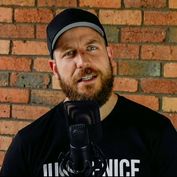 We want to change the way people help people. To do that, we need to continually improve the understanding of the needs of communities and causes of disadvantage. To do that, we actually need to guide people to mastering their own character in order to develop perspective that allows them to understand other people's circumstances. On this mission, we have seen children being 'taught' disadvantage in a way that actually harms their capacity for resilience and real understanding, not through any bad intent, but through confusion as to the best way to develop understanding and agency for people of all ages. If you, or anyone you know are looking to build character and resilience, or looking to have a meaningful impact in the world, enquire about our courses and opportunities for partnership below. 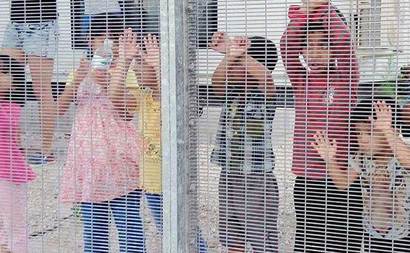 Image Courtesy of Mums 4 Refugees Image Courtesy of Mums 4 Refugees
This week we have gotten angry about current proposals to allow discrimination in schools based on sexuality, and the continuing blatant mistreatment of asylum seekers on Manus Island and Nauru.
With mental health day yesterday, we need to speak up to ensure that we create environments that foster inclusivity and opportunity for all, in order to provide avenues to improved mental health for everyone. In Australia we are in a privileged position to be able to be lift people up, we can't allow our policies to be those that segregate, discriminate and keep people down. To support our work providing avenues to opportunity from all walks of life, please subscribe here; for less than $10 a week you can help us ensure individuals and communities get proper housing, employment and good mental health. 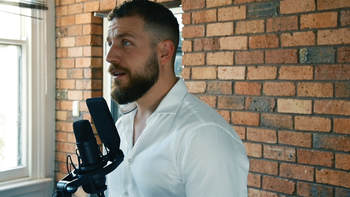
We've come a long way with encouraging men to speak up about their poor mental health and to let people know when they are struggling.
But what are we doing after that? The Just Be Nice Project is committed to not only improving the conversation around mental health, but also improving the access to the material support required to create environments where people can flourish. You can support our work by subscribing and becoming a JBN Legend Here, we can't do it without the support of our amazing partners and subscribers. Helping people feel good about doing good is an important element of engagement, but it cannot be the end-game to getting people involved in positive impact.
Is it easy to feel good about things that don't do that much good? Absolutely. Is that the best we can do? Absolutely not. The end game, and point of help, should always be about what happens for the person in need. Teaching people what effective looks like for people in need, rather than finding ways to make people feel good about attempts at help, is the real future of helping people, help people. Our work at the Just Be Nice Project is about harnessing the potential of every organisation and individual into effective impacts for those in need, while remaining engaging, relevant and worthwhile to those providing the help. There is a better way. Creating extraordinary positive change in the world, by helping people make ordinary positive change.
As we end the week with a different Prime Minister to the one we started seven days ago, it is time for us to ask ourselves, where to from here?
Do we want to be a country that is known for it’s outstanding ability to lift people from disadvantage, or for our propensity to keep people there. Do we want to be a country that celebrates success by creating an environment in which anyone who is so inclined, has the support and opportunity to pursue it, in whatever area they wish to achieve success? Do we want to be a country that looks after the most vulnerable? That by looking after the most vulnerable that are already here, set a precedent for those who may seek help from elsewhere. Do we want to be a country that ensures that the people who live here reap the benefits of the ever improving economy of energy and food production. Ensuring that everyone has access to power, water and food without the artificial price-raising of enterprise attacking the access of basic necessities for communities, businesses and individuals across the country. Do we want to be a country that leads the way, not in number, but in policy and innovation, in the direction of economic conservation. Protecting our environment and amazing natural resources not only for today but for future generations. Do we want to be known as world-leaders in environmental protection and energy production, or as followers, bowing to the concerns of the quarterly profit reports of large multi-national corporations. Do we want to be a country that values the education of all its children? Or do we want to prioritise the education of those living in certain postcodes? Do we want to be a country that acknowledges and addresses, effectively and in the long-term, the concerns and difficulties faced by our indigenous peoples? Or do we want to make excuses, blame those who have been dispossessed and disrupted by colonisation and ignore the glaring inequality of opportunity that plagues these communities? Do we want a country run by in-fighting, character poor, news poll pandering, race-baiting, dog whistling rhetoricians? Or by politicians who understand the needs of Australians and the possibilities that their office brings to unite a country under values of true acceptance, mateship and understanding. Do we want to engage further in the politics of division? Of down-blaming, blaming those less fortunate, those who aren’t in power, those who have the least amount of resources to effect change? Or do we want to hold those with the greatest capacity for positive change accountable to actually making that change. Are we committed to rewarding those who play the long game? Those who believe that everyone can do better, if we all work together. Those who believe that a country of humans doesn’t have to be separated into winners and losers, because every person has different possibilities to live fulfilling, safe and happy lives. That removing the barriers to everyone living those lives is a noble priority. Can we acknowledge that people want connection and contribution. That a happy country is one that isn't only not fighting with itself, but not fighting with others. A strong country is one that is comfortable with its identity, with its ability to win over new citizens, leading by example. As we enter yet another leadership change and head towards another federal election, we have a number of important decisions to make, individually and collectively. Where to from here? |
Just Be NiceA collection of articles relevant to pursuing the effective execution of altruism in the search for equality of opportunity. Archives
February 2020
Topics
All
|
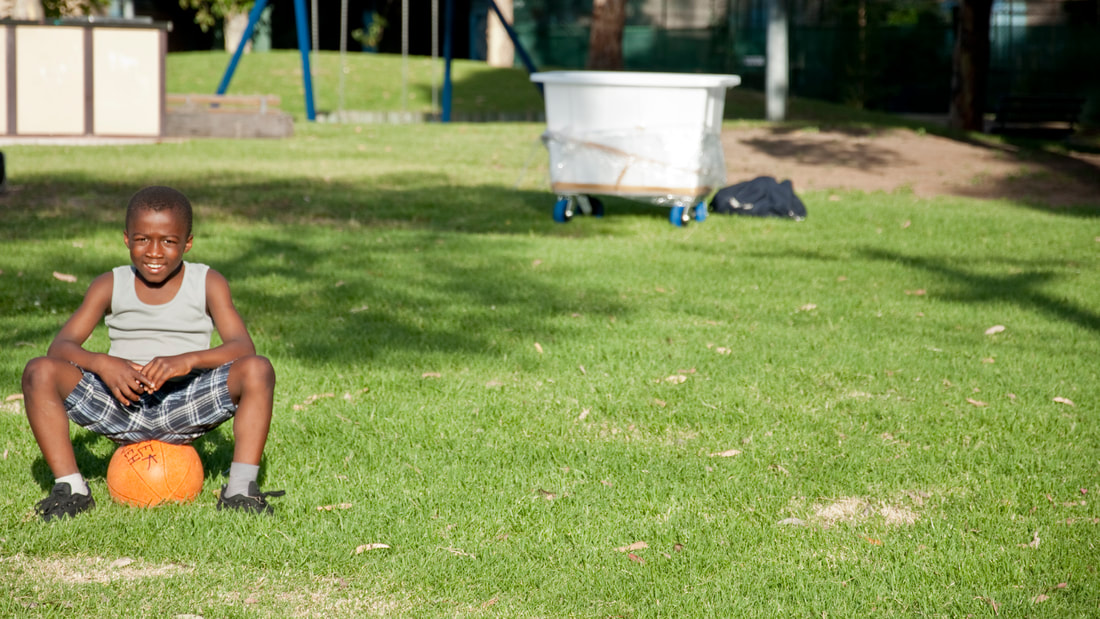
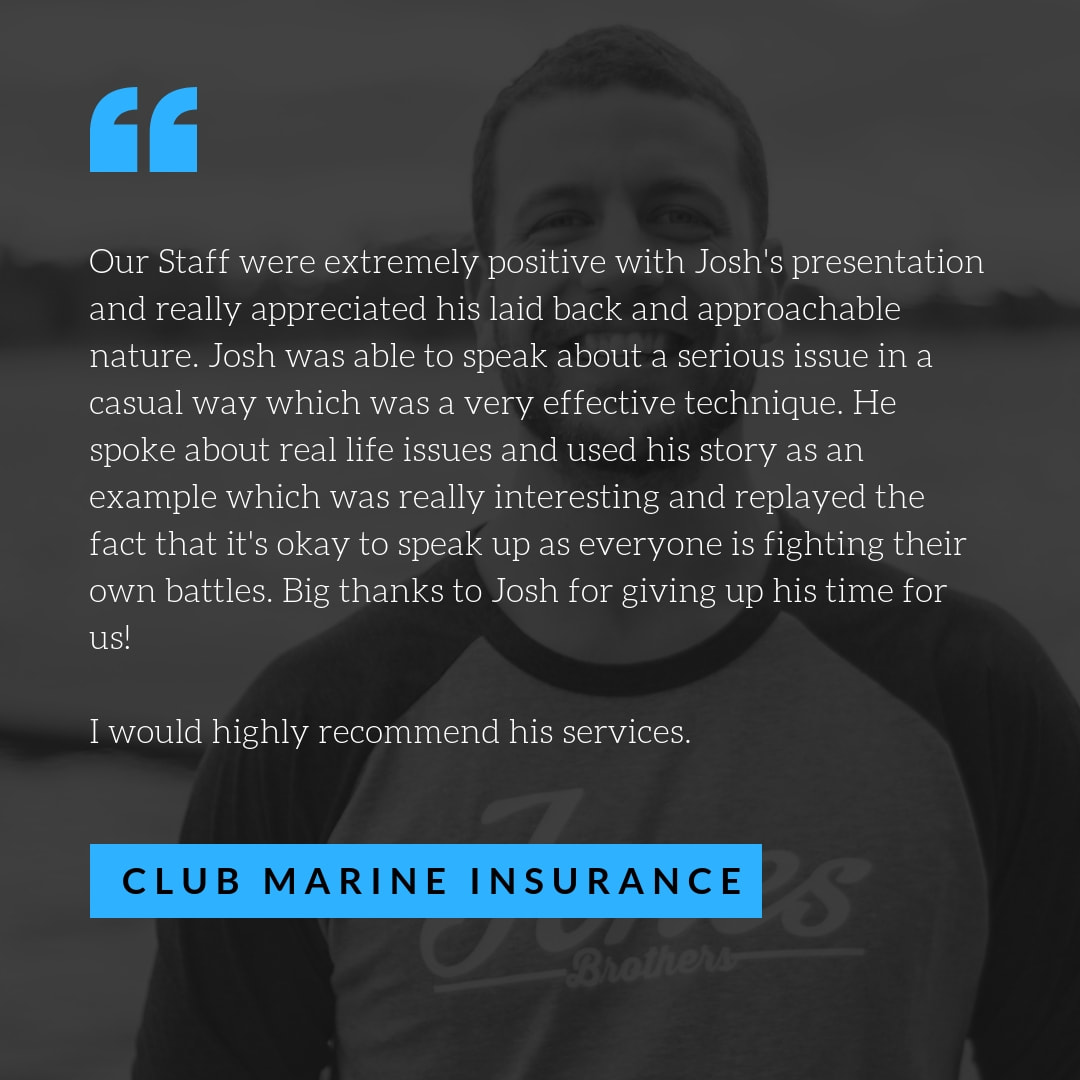
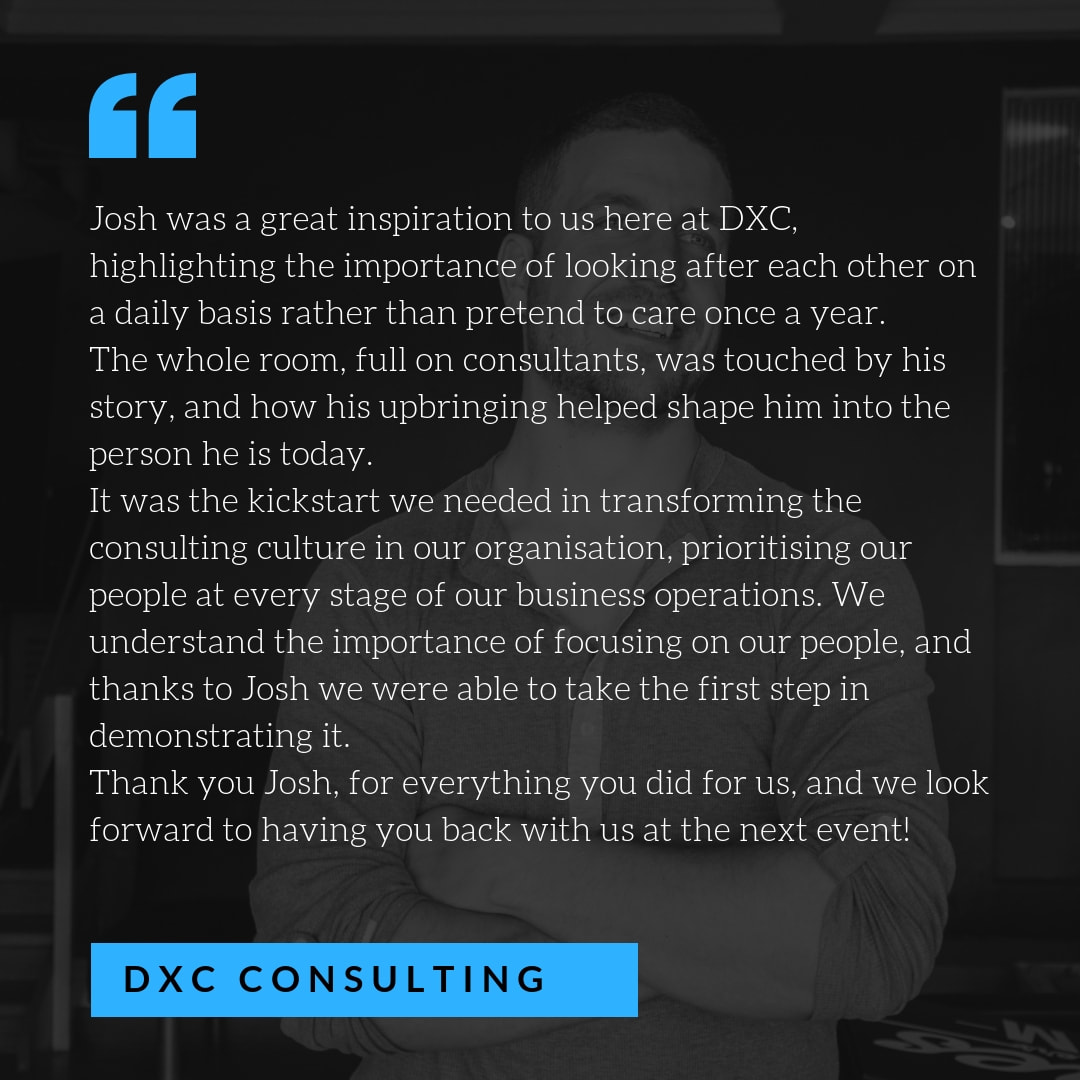
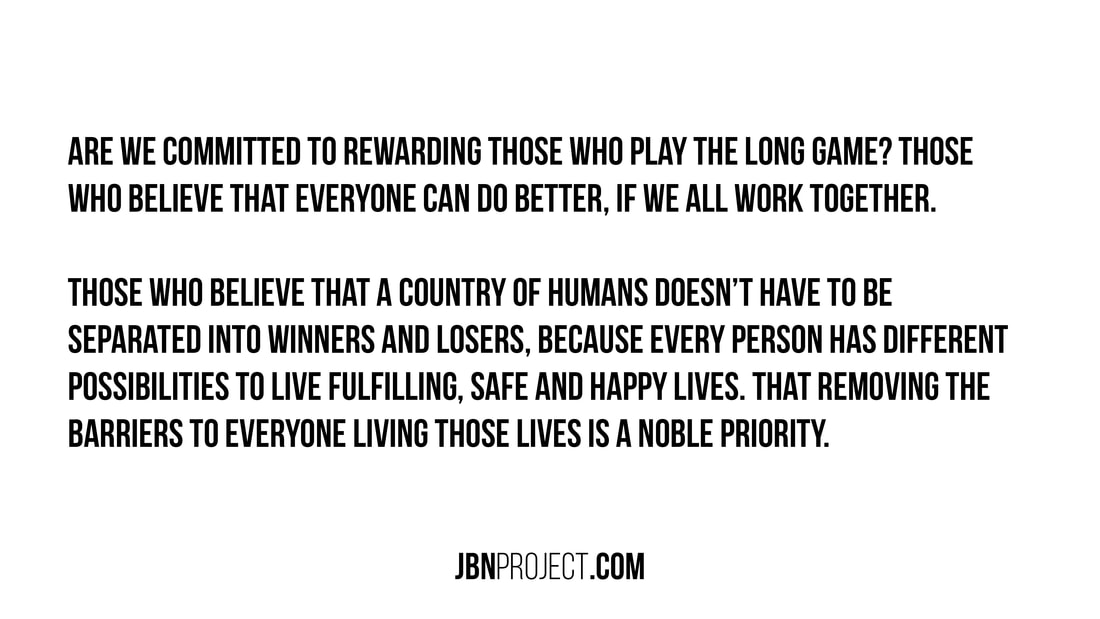
 RSS Feed
RSS Feed